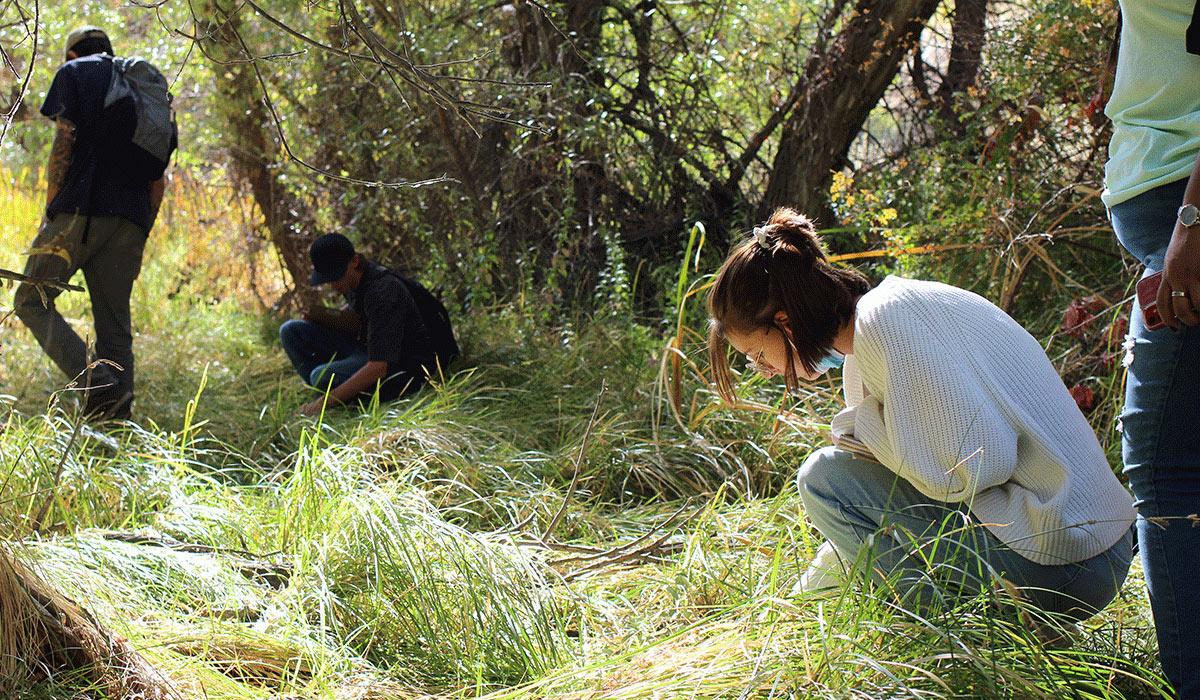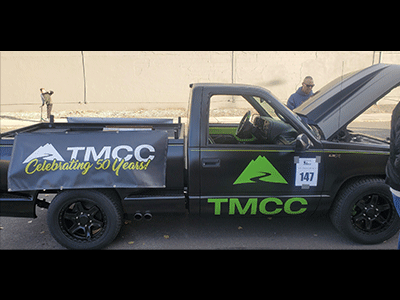
TMCC EcoBlitz Continues Observation of San Rafael Park
TMCC’s EcoBlitz event returned this fall to resume its measurement and observation of the four different environmental zones in Reno’s Rancho San Rafael Park. The inaugural event took place last spring, and several participants from the community made a point to return to the second interaction of the event, which happened on Oct. 1.
“We had 300 more observations than last semester, so we went from 1600 to 1900 [recorded observations],” said TMCC Biology Professor Cecilia Vigil, who co-organized the event with Dr. Megan Lahti. Participants—called “Citizens of Science”—used the iNaturalist app to gather snapshots, timestamps and GPS coordinates of both flora and fauna.
Vigil and Lahti divided the park into four sections from North to South, and organized groups of TMCC students and community members into distinct areas: forest, grasslands, sage and the riparian area, which was located the farthest South. Those who participated on Oct. 1 were responsible for gathering samples and recording data. There’s still plenty of work to be done, but Vigil explained that students in various Biology classes, including Biology 190 and 191, are assisting with the analysis of the information that was collected during the EcoBlitz. Vigil will submit a report to Nevada INBRE, who supported the grant that funded the two events.
However, the data will be available to anyone who is interested. “San Rafael Park will also have the soil analysis, the insects and all the data we input into iNaturalist,” Vigil explained. “My plan is to replicate [the EcoBlitz] every semester. Through the years, this will enable us to compare spring and fall, and also how climate change is going to affect the biotic and abiotic components of the park.”
The EcoBlitz also offers TMCC students the opportunity to participate in undergraduate research. “If students do undergraduate research, it builds their confidence, their resume and it helps them to figure out if they want to continue their studies in graduate school. Also, we’ve seen that it helps our students get a job, because if you graduate with a 4.0 that’s great, but if you graduate with a 3.6 and have undergraduate research under your belt, you’re much more sellable,” Vigil said.
For students who have an interest in science and crave hands-on experience, TMCC’s EcoBlitz can provide practical experience in specimen collection, observation, research and data analysis that can make a difference in a professional career, while providing our community with vital information about the state of our natural spaces.
For more information about studying Biology at TMCC, contact the program at 775-673-8251.
The Sky’s the Limit for Career Technical Education (CTE)
TMCC’s Technical Sciences Division—in particular its Architecture and Transportation Technologies programs—are moving forward and building from the ground up! Career and Technical Education (CTE) programs like Architecture, Automotive and Diesel programs not only give students practical, hands-on skills in those particular fields, but also help students to hone their critical thinking and problem-solving skills through project-based learning, but showcase solutions in livable or workable spaces, and engines that can run.

The TMCC Truck is a project that students and faculty in the Automotive Program have embraced. It was showcased in this year's Nevada Day Parade.
Most recently, the Automotive Department took part in the Nevada Day Parade by showcasing its student-faculty creation: the TMCC Truck! If you’ve never seen it, the truck features the signature TMCC green logo on its sides and interior details. The truck was a generous donation to the program which became a favorite creative project of TMCC automotive students.
The Architecture Program, too, has increased its presence in the community by opening opportunities to more students. “The Architecture Program has a strong presence with ACE High School,” said Technical Sciences Director, Kreg Mebust. “Recently, we have moved these students into the architecture studio classroom at TMCC, which is more of a traditional drafting space. The students really love it.”
Although Architecture isn’t traditionally thought of as a CTE class, it is: students in these classes learn STEM science standards along with industry standards and practical applications they can carry with them into this career. Additionally, students begin earning credits toward skills certificate and a Certificate of Achievement, which can then be stackable with a two-year Associate of Applied Science degree.
In addition to dual-credit opportunities for high school students, TMCC’s Architecture Program is unique in its focus on Residential Design. “Nevada is the only state that recognizes and licensed residential designers,” Mebust explained. “The State Board of Architecture loves our program, and for the past several years has been very supportive.” Additionally, TMCC is the only institution in Nevada assisting applicants with their education to become residential designers.
Mebust, who is an active member of the State Board and who writes the examination questions presented to prospective residential designers seeking licensure, explains that students seeking a career as an architect often discover that the journey to becoming a residential designer is one that is much more direct.
“In the program at TMCC, we really focus on the foundations of design,” Mebust explained. “We also focus on the importance of education, and how we can support the advancement of people and their careers in this field that literally shapes the interior and exterior spaces of our community.”
To learn more about the Architecture and Automotive Programs, contact Applied Technologies at 775-856-5300.






